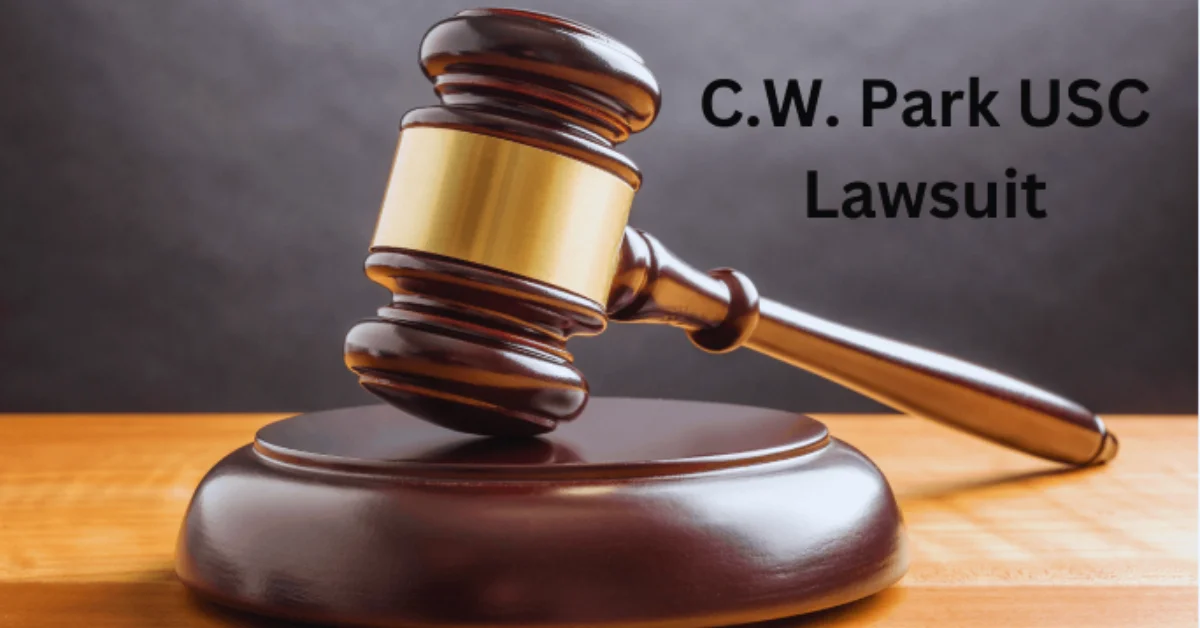Unraveling the USC Lawsuit: The Controversial Story of C.W Park
In the world of higher education, scandals and controversies are no strangers. They can shake even the most prestigious institutions to their core, tarnishing reputations and leaving a trail of uncertainty in their wake. One such scandal that has recently come to light involves renowned professor C.W. Park and his alleged misconduct at the University of Southern California USC Lawsuit. This lawsuit has captured headlines and sparked intense discussions, serving as a harsh reminder that even esteemed universities are not immune to controversy.
So, what exactly is this lawsuit all about? Who are the parties involved? And what might be the consequences for both Professor Park and USC? In this article, we will delve into these questions while exploring how this case could potentially impact higher education as a whole.
Buckle up as we embark on an intriguing journey through allegations, responses, predictions, and aftermaths surrounding the controversial saga of C.W. Park’s lawsuit against USC!
The Context and Case History
To understand the USC lawsuit involving C.W. Park, it is crucial to delve into the context and case history surrounding this controversy. The story begins with Professor Park, a renowned academic known for his expertise in marketing and consumer behavior. He had been a valued member of USC’s faculty for several years, earning accolades and respect from both students and colleagues.
However, things took an unexpected turn when allegations of misconduct emerged against Professor Park. It was alleged that he engaged in inappropriate relationships with some of his students, crossing professional boundaries in the process. These accusations sent shockwaves through the university community and prompted an internal investigation by USC.
The case history reveals that similar allegations have been made against Professor Park in the past. In fact, this current lawsuit is not the first time he has faced such serious accusations during his tenure at USC. Previous incidents were reportedly handled internally within the university without any legal action being taken.
The repeated nature of these allegations raises questions about how they were addressed by both Professor Park and USC administration over time. Critics argue that there may have been a failure to adequately address or take appropriate disciplinary measures earlier on.
As news of the lawsuit broke, it gained significant media attention due to its potential impact on higher education institutions across the country. Many are closely watching how this case unfolds as it could set precedents for handling similar situations in other universities.
In our next section, we will explore more about who exactly is involved in this high-stakes legal battle – both parties who find themselves at opposite ends of this contentious dispute: C.W. Park and University of Southern California (USC). Stay tuned!
Parties Involved in the Lawsuit
The USC lawsuit involving C.W. Park has captured the attention of many, but who exactly are the parties involved in this controversial case? Let’s dive into the details.
We have C.
W. Park himself, a former assistant professor at USC’s School of Cinematic Arts. Park alleges that he was wrongfully terminated due to his race and national origin, claiming that he faced discrimination during his time at the university.
On the other side of the legal battle is none other than USC itself. As one of America’s most prestigious universities, USC is no stranger to controversy in recent years. The institution has been accused of mishandling sexual assault cases and facing scrutiny over its admissions practices.
Additionally, there are various individuals within USC who may be implicated in this lawsuit. These could include administrators or faculty members who were involved in decisions regarding Park’s employment status and any alleged discriminatory actions against him.
It is worth noting that lawsuits like these can often attract media attention and public interest beyond just those directly involved. Many individuals with similar experiences or concerns about discrimination may rally behind Park as they see his case as emblematic of larger issues within higher education institutions.
As this high-stakes legal battle unfolds, it remains uncertain how it will ultimately play out. Both sides will present their arguments and evidence to support their claims and defenses before a judge makes a final ruling on the matter.
USC’s Response to Previous Allegations
Over the years, the University of Southern California (USC) has faced its fair share of controversies and allegations. However, it cannot be denied that USC has taken steps to address these issues head-on and ensure accountability within its institution.
In response to previous allegations, USC implemented various measures aimed at preventing similar incidents from occurring in the future. The university established an Office of Professionalism and Ethics (OPE), which is responsible for promoting integrity and ethical behavior among faculty, staff, and students.
Additionally, USC initiated a comprehensive review of all academic programs and departments to identify any potential areas of concern or vulnerability. This thorough evaluation allowed the university to make necessary changes and strengthen its policies surrounding admissions, hiring practices, funding allocations, and student support services.
Moreover, USC launched awareness campaigns addressing topics such as sexual harassment prevention, diversity and inclusion efforts on campus. These initiatives were designed not only to educate individuals about their rights but also foster a safe and inclusive environment for everyone within the university community.
Furthermore; USC collaborated with external organizations specializing in ethics training; compliance audits conducted by independent third parties have been instrumental in ensuring transparency throughout the process. By engaging these external entities; they demonstrated their commitment towards impartiality when investigating allegations against members affiliated with their institution.
Overall; while past allegations have undoubtedly tarnished USC’s reputation; it is evident that they have made genuine efforts to rectify past mistakes as well as prevent future occurrences through proactive measures like establishing OPE conducting comprehensive reviews promoting awareness campaigns collaborating with external organizations. These actions demonstrate that USC is committed to upholding ethical standards within higher education institutions
Predicted Outcome of the Lawsuit
As the highly publicized lawsuit against USC and C.W. Park continues to unfold, many are eagerly speculating on the potential outcome of this contentious legal battle. While it is still too early to definitively predict what will happen, experts and analysts in the field have offered their insights based on previous similar cases.
In one possible scenario, if substantial evidence supporting the allegations against C.W. Park is presented during trial, it could greatly weaken his defense and bolster the plaintiffs’ case. This might result in a settlement or even a ruling in favor of the aggrieved parties.
On the other hand, if USC can successfully counter these allegations by providing strong evidence that supports their due diligence in investigating complaints against C.W. Park, they may be able to convince the court that they acted responsibly and appropriately given the information available at that time.
It’s important to note that lawsuits like these often rely heavily on witness testimonies and documentary evidence which can significantly sway a judge or jury’s decision-making process. Therefore, both sides will likely be strategizing meticulously to present their strongest arguments and challenge any weaknesses in their opponent’s case.
Only time will tell how this lawsuit will conclude. It could potentially set an important precedent for future cases involving educational institutions’ handling of sexual harassment claims as well as faculty member misconduct.
Impact of the Lawsuit on USC and Higher Education
The USC lawsuit involving C.W. Park has sent shockwaves through the higher education community, causing widespread concern about the impact it will have on USC and the broader field of education. This high-profile case has garnered significant attention, raising questions about integrity, accountability, and the future of higher education.
There is no denying that this lawsuit could tarnish USC’s reputation. The negative publicity surrounding allegations of misconduct by a prominent faculty member like C.W. Park can erode public trust in the institution as a whole. Prospective students may think twice before choosing USC as their university of choice if they perceive it as an environment where such behavior goes unchecked.
Furthermore, this scandal might also have far-reaching consequences for other educational institutions across the nation. As news spreads and discussions around ethical practices intensify, universities everywhere are under increased scrutiny to address any potential issues within their own ranks. This could prompt sweeping reforms in how universities handle cases of misconduct and ensure transparency in all academic affairs.
Additionally, this lawsuit highlights the urgent need for systemic changes within higher education institutions to prevent similar situations from arising in the future. Universities must prioritize creating safe environments where faculty members are held accountable for their actions and students can pursue their studies without fear or intimidation.
We cannot overlook how this controversy affects current students at USC who find themselves caught up in an unfortunate situation not of their making. The disruptive nature of lawsuits can create tension on campus and distract from learning opportunities that should be at the forefront of any educational institution’s mission.
USC’s Measures Post-Allegations
In the wake of the allegations against C.W. Park, USC has implemented a series of measures to address the situation and ensure accountability within their institution. These post-allegation actions by USC are aimed at not only addressing immediate concerns but also preventing such incidents from happening in the future.
USC has launched an internal investigation to thoroughly examine all aspects related to the alleged misconduct. This investigation aims to uncover any potential wrongdoing and hold those responsible accountable for their actions. By conducting this inquiry, USC demonstrates its commitment to transparency and justice.
USC is revisiting its policies and procedures regarding admissions and faculty hiring processes. The goal is to strengthen these protocols by implementing stricter guidelines and increased scrutiny during selection processes. This proactive approach will help prevent any potential improprieties in the future.
USC has been engaging with stakeholders including students, alumni, faculty members, and community leaders through town hall meetings and open forums. These platforms provide an opportunity for individuals associated with USC to voice their concerns, suggestions, or grievances openly. By actively listening to feedback from various stakeholders, USC aims to rebuild trust within its community.
Moreover, as part of their measures post-allegations. USC is focusing on improving communication channels between different departments within the university structure. Enhancing collaboration across divisions will enable better oversight mechanisms in place that can detect any irregularities promptly.
Lastly, USC has vowed continued cooperation with law enforcement agencies throughout ongoing investigations into C.W. Park’s alleged actions.
These measures taken by the university demonstrate its dedication towards rectifying past mistakes. While establishing a stronger foundation for ethical practices moving forward
Conclusion
The USC lawsuit involving C.W. Park has undoubtedly brought to light the deep-rooted issues within the university and higher education as a whole. The allegations against Park, along with previous scandals at USC, have raised concerns. About accountability and ethical practices within academic institutions.
While it is difficult to predict the exact outcome of this lawsuit. It is clear that USC must take decisive action in order to regain public trust. And ensure a safe and inclusive environment for all students. The university’s response to previous allegations suggests a commitment to addressing systemic problems. But only time will tell if these measures are truly effective.
The impact of this lawsuit extends beyond just USC. It serves as a wake-up call for universities across the country to reassess their policies and procedures. When it comes to faculty misconduct. It highlights the need for increased transparency, stronger oversight, and more robust mechanisms for reporting and addressing allegations of wrongdoing.
The C.W. Park USC lawsuit sheds light on larger issues within academia that cannot be ignored or swept under the rug. It serves as a reminder that no institution is immune from scandal or controversy, but how they respond. Can make all the difference in rebuilding trust and ensuring a brighter future for higher education.






